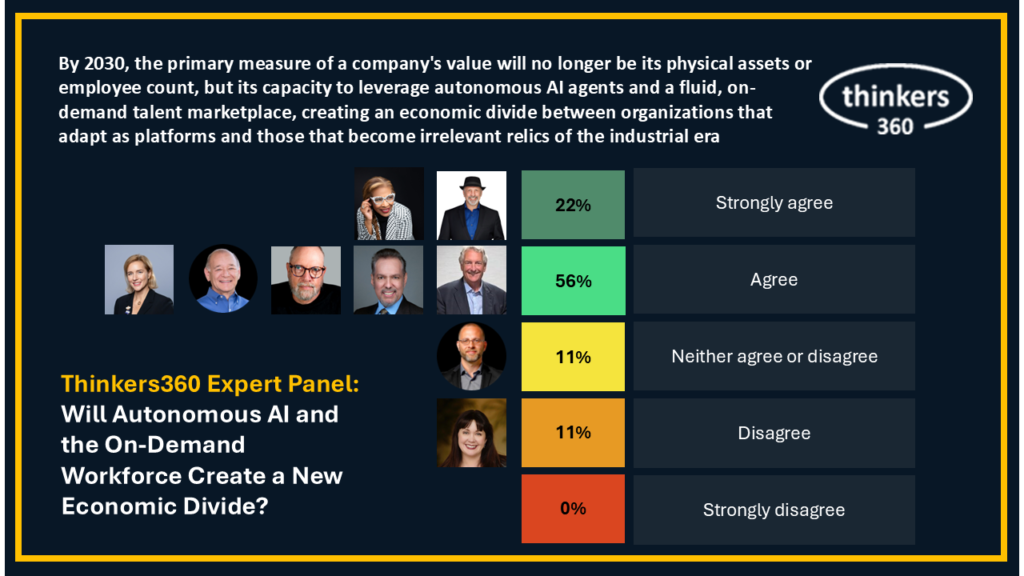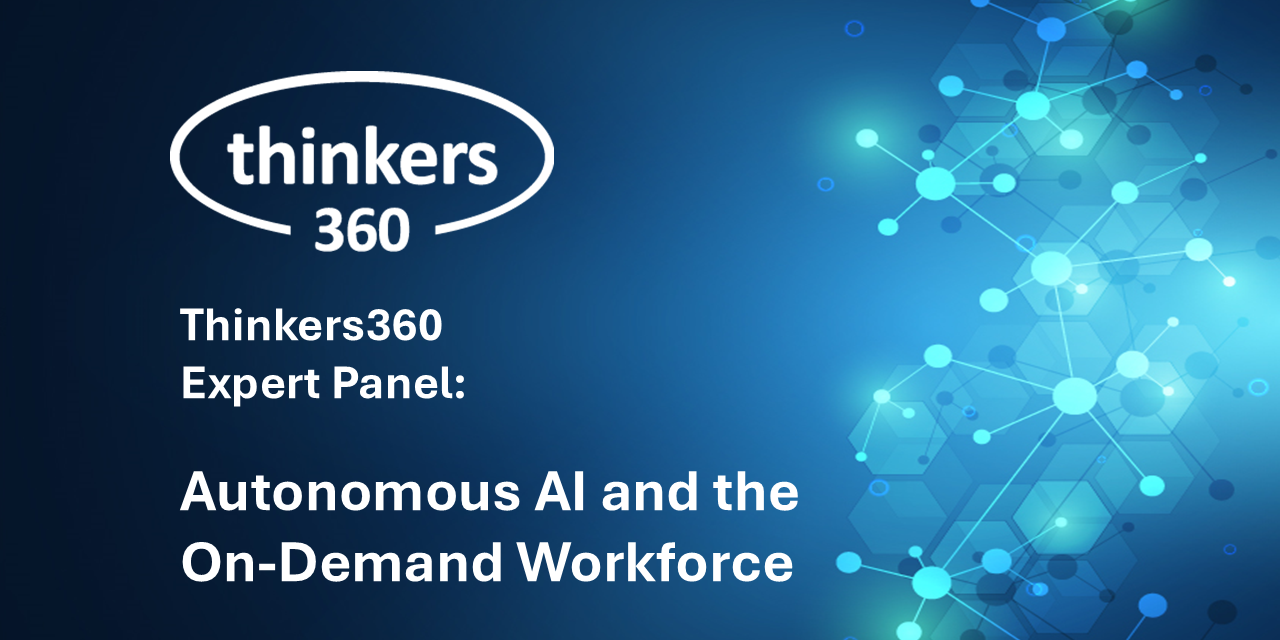Thinkers360 Expert Panel: Will Autonomous AI and the On-Demand Workforce Create a New Economic Divide?
Welcome to a new series from Thinkers360! We’re excited to present a fresh format for our Expert Panel discussions, offering a deep dive into the most pressing topics in technology and business. Rather than a traditional Q&A, we’ve curated a panel of our top thought leaders, including Thinkers360 Ambassadors, to respond to a single, provocative statement. This approach allows us to capture a wide spectrum of perspectives, from concise declarations to nuanced, detailed arguments.
For our next panel, we asked a crucial question facing our society: “By 2030, the primary measure of a company’s value will no longer be its physical assets or employee count, but its capacity to leverage autonomous AI agents and a fluid, on-demand talent marketplace, creating an economic divide between organizations that adapt as platforms and those that become irrelevant relics of the industrial era.”
Panelists were asked to select one of five options: Strongly Agree, Agree, Neither Agree or Disagree, Disagree, or Strongly Disagree.

Thinkers360 – Expert Panel – Will Autonomous AI and the On-Demand Workforce Create a New Economic Divide?
Our panel of Thinkers360 experts largely agrees that by 2030, the primary measure of a company’s value will shift from physical assets to its capacity to leverage autonomous AI agents and a fluid, on-demand talent marketplace. This digital transformation is expected to create a significant economic divide, but the experts believe success requires more than just technology; it demands a new leadership mindset. According to CB Bowman, CEO of Courage Consulting, the key differentiator will be “Strategic Courage”—the capacity to use agentic AI not to replace people, but to “elevate human creativity, decision-making, and purpose.” Adding to this, Mitchell Levy, a Global Credibility Expert, argues that the most valuable organizations will integrate these tools into a “purpose-driven framework,” stressing that value will flow to enterprises that combine “innovation with integrity.” As Ira Wolfe, President of Poised for the Future Company, puts it, “The winners will be the ones who know how to ‘rent’ brains—human and digital—on demand,” rewarding “speed, agility, and imagination” over legacy size.
Many panelists see this shift as an acceleration of an existing trend toward valuing intangible assets. Lenka Pincot of the Project Management Institute notes that factors like brand equity already carry immense weight and sees AI accelerating this, while cautioning that most enterprises still lag in data governance. Backing this with data, Michael Fauscette of Arion Research reveals this transition may be happening faster than the 2030 timeline, with the economic divide emerging as an “execution gap” between organizations that build human-digital collaboration frameworks and those that don’t. This sentiment is echoed with caution by others. Dr. Joe Perez, CTO at CogniMind, agrees with the direction but hesitates on the word “primary,” emphasizing that the winning bet is on the mix of aggressive AI use with “governance and human judgment.” Similarly, Dave Ulrich of the University of Michigan reminds us that intangible value isn’t new and that AI will likely become “woven into” existing predictors of value, rather than replacing them entirely.
Pushing back on a simple “adapt or die” scenario, other experts predict a more nuanced, hybrid future for the future of work. Jonathan H. Westover, PhD, of Human Capital Innovations, foresees a blended reality with “hybrid structures” where valuation combines traditional and digital metrics, varying by industry. Taking a stronger stance, Amii Barnard-Bahn of Barnard-Bahn Coaching & Consulting disagrees with the premise, pointing to “critical blind spots” in people-fueled sectors like healthcare and legal services where human empathy is irreplaceable. She argues the real divide won’t be about technology adoption, but between organizations that thoughtfully integrate AI to “enhance human capabilities” versus those that attempt “wholesale human elimination where it shouldn’t occur.”
Read on to explore our expert panelists’ opinions in depth and join us on Thinkers360.com to be part of the conversation.
By 2030, the primary measure of a company’s value will no longer be its physical assets or employee count, but its capacity to leverage autonomous AI agents and a fluid, on-demand talent marketplace, creating an economic divide between organizations that adapt as platforms and those that become irrelevant relics of the industrial era.
Agree
Strongly Agree
“I strongly agree. By 2030, organizational value will not be defined by physical assets or employee headcount but by an enterprise’s capacity for Strategic Courage. Future-focused capacity means having the Courage to embrace autonomous AI agents, fluid talent marketplaces, and dynamic business models that accelerate innovation and resilience.
Strategic Courage requires leaders to see disruption as an opportunity rather than a threat, reframing failure as a necessary step toward adaptation and growth. However, it also requires leaders to take responsibility for preparing their employees for this future. Organizations must not stand by and assume employees will learn on their own. Instead, they must actively prepare their people to be future-focused, providing education, development, and the psychological safety to offer forward-looking contributions that shape the enterprise.
Companies that lead with Strategic Courage will integrate AI not to replace people, but to elevate human creativity, decision-making, and purpose while leveraging global on-demand talent to remain agile. Those who cling to rigid, industrial-era structures will be left behind. By 2030, the defining measure of corporate value will be the courageous fusion of human potential with technological possibility.” – CB Bowman, CEO, Courage Consulting
Strongly Agree
“By 2030, the organizations creating the most value will be those that harness autonomous AI agents and embrace fluid, on-demand talent ecosystems. But what will truly separate thriving companies from relics will not just be their technological adoption; it will be their clarity of purpose and their credibility in execution.
Organizations that integrate AI and flexible talent into a purpose-driven framework, aligning actions with stakeholder needs, will thrive. Those that treat these tools only as efficiency levers, without building trust and meaningful impact, risk irrelevance. Value will flow to the enterprises that combine innovation with integrity, scalability with human-centered leadership.” – Mitchell Levy, Global Credibility Expert, Executive Coach & CEO, Credibility Nation
Agree
“I agree with the statement, though I see 2030 as a continuation of a shift that is already underway rather than a sudden break. Even today, the primary measures of company value are no longer tied mainly to physical assets or employee count. Investors and markets prioritize financial performance, cash flow, and market-based indicators such as capitalization and valuation multiples. Increasingly, intangible factors like brand equity, intellectual property, leadership, and innovation capacity carry more weight than factories or fleet size. Human capital, too, is valued more for adaptability, culture, and specialized skills than for sheer headcount.
By 2030, autonomous AI agents and fluid, on-demand talent ecosystems will accelerate this trend. Organizations that succeed in blending human and AI capabilities will operate with enterprise agility and scalability. However, widespread use of autonomous AI requires strong data infrastructure, governance, and cultural readiness—areas where most enterprises still lag. A handful of leaders will set the pace, but many will continue to adopt incrementally. Likewise, while fluid and on-demand talent will grow, they will not replace the need for engaged workforces that provide loyalty and institutional knowledge. The divide will widen, but traditional measures will not vanish completely by 2030.” – Lenka Pincot, Chief of Staff to the CEO, Project Management Institute
Agree
“By 2030, no one will care how many people you employ or how much office space you’ve got. The winners will be the ones who know how to “rent” brains—human and digital—on demand.
This isn’t about swapping people for bots. It’s about rethinking how work gets done, solving problems for customers, and how customers get served. Leaders need to start asking:
- If AI does the grunt work, what unique value should my people deliver?
- How do I get employees, freelancers, and agents to collaborate seamlessly
- Do my business model and value proposition still hold up when adaptability is essential?
The future won’t reward bigness or legacy. It will reward speed, agility, and imagination.” – Ira Wolfe, Chief Googlization Officer, President, Poised for the Future Company
Agree
“The survey data from our upcoming book “Building the Digital Workforce”, supports this trajectory, with 79.8% of business leaders expecting fundamental industry transformation within five years and 71.1% viewing agentic AI as essential for competitive positioning rather than mere operational efficiency. However, the timeline may be compressed; our research shows 49.1% of organizations in the US already have production digital workers deployed, suggesting this transition is accelerating faster than the 2030 timeframe.The concept of “adapting as platforms” aligns with our findings on organizational capability development. Organizations that build comprehensive digital workforce capabilities; technical integration expertise, human-digital collaboration frameworks, and adaptive governance structures; create foundation capabilities that enable continuous evolution. These become the “platforms” for leveraging autonomous agents effectively.The economic divide is already emerging in our data. Organizations struggling with technical integration complexity (48.5%) and skills gaps (42.1%) face execution barriers that successful implementers have overcome. As agentic AI capabilities expand and competitive pressure intensifies, this execution gap will likely determine which organizations capture transformation opportunities versus those overwhelmed by implementation complexity. The fundamental shift from human-centered to capability-centered value creation through a “hybrid workforce” is underway.” – Michael Fauscette, CEO and Chief Analyst, Arion Research, LLC
Agree
“I chose “Agree” rather than “Strongly Agree” because it’s my conviction that the statement might go a little too far. AI agents and fluid talent marketplaces will reshape how work gets done by 2030. I expect them to amplify both scale and speed across many business functions. Calling them the primary measure of value, though, compresses and oversimplifies a complex reality. Every innovation wave rewarded early movers. That is, the differentiator has always been execution, leadership, and understanding what customers actually need. Those fundamentals didn’t vanish just because the tools improved.
When customers buy or investors commit, they’re judging more than your agents and APIs. They look for a track record, judgment under pressure, data stewardship, and whether the team can survive hard times for an extended period. I believe organizations that embrace platform thinking will outpace those glued to rigid models. My hesitation to give my full endorsement lives in the word “primary” in the statement. Value in durable companies spreads across capability, trust, culture, and learning velocity. Use autonomous agents aggressively? Yes! Pair them with governance and human judgment? Absolutely! And THAT mix is what I’m willing to bet on.” – Dr. Joe Perez, Chief Technology Officer, CogniMind / SolonTek Services
Agree
“Intangible value is NOT new. Today, estimates are that intangible value represents between 60 to 90% of a firm’s market value. Two firms in the same industry may have variance in market value defined by price/earnings ratio. We studied three general factors showing this intangible value: 35 to 40% financial results and predictability; 30 to 35% strategic clarity and unity; 25 to 30% human capability (talent + organization + leadership + HR function. Using technology (AI) will likely become woven into the above, but it is not the only predictor of intangible value. See books Why the Bottom Line Isn’t; Leadership Capital Index.” – Dave Ulrich, Rensis Likert Professor Emeritus, University of Michigan & Partner, The RBL Group
Neither Agree Nor Disagree
Neither Agree Nor Disagree
“While AI agents and on-demand talent will certainly reshape organizational value by 2030, I believe we’re heading toward a more nuanced reality than a binary “adapt or become irrelevant” scenario. Company valuation will likely reflect a blend of traditional metrics and new digital capabilities, varying significantly by industry. Manufacturing, healthcare, and infrastructure sectors will continue valuing physical assets alongside AI integration, while knowledge-intensive industries may shift more dramatically toward platform models.
The most successful organizations will likely create hybrid structures that combine stable cores of specialized talent with flexible external networks. This evolution will happen gradually rather than through sudden disruption. The true economic divide won’t simply be between “platforms” and “relics,” but between organizations that thoughtfully integrate AI and fluid talent strategies in ways that align with their specific market contexts versus those that either resist change entirely or implement technological solutions without strategic purpose.” – Jonathan H. Westover, PhD, Founder and CEO; Chief Academic and Learning Officer, Human Capital Innovations
Disagree
Disagree
“I view our journey as one of nuanced organizational evolution rather than a complete paradigm shift. While I agree with the core premise — that AI-enabled platform models will increasingly differentiate high-performing companies from traditional asset-heavy structures — there are critical blind spots in this forecast.The prediction oversimplifies value creation across different sectors, particularly those where human expertise, relationships, and physical presence remain irreplaceable. For example, people-fueled sectors like healthcare, financial and legal services, hospitality, and high-stakes sales will benefit from AI assists, but these roles are fundamentally dependent on uniquely human traits that can’t be easily replicated by AI or automated through platform models. These domains will likely see hybrid transformation where AI augments rather than replaces human expertise, relationships, and judgment. A physician’s diagnostic capabilities may be enhanced by AI, but patients still value empathy and complex decision-making that can’t be commoditized through platform models.The real divide won’t be between “platform adapters” and “industrial relics,” but between organizations that thoughtfully integrate AI to enhance human capabilities versus those that attempt wholesale human elimination where it shouldn’t occur. Success will require strategic discernment about when to leverage AI for efficiency and when to preserve irreplaceable human elements that drive authentic value creation.” – Amii Barnard-Bahn, CEO and Founder, Barnard-Bahn Coaching & Consulting








